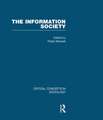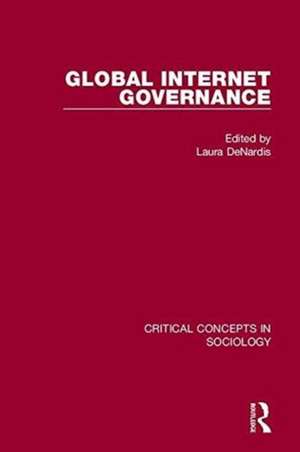Global Internet Governance: Critical Concepts in Sociology
Editat de Laura DeNardisen Limba Engleză Hardback – aug 2018
Who controls the Internet? The question has profound implications for our access to knowledge, the pace of economic growth, and the protection of human rights, not least freedom of expression and the right to privacy. And the question’s importance has been underscored in recent times by landmark events, including revelations about the actual and potential power of social-media companies, and the breathtaking extent of surveillance by intelligence and security organizations, such as the NSA in the United States and Britain’s GCHQ.
It is perhaps only in the last several years that issues about and around the governance of the Internet have entered the public consciousness, but serious academic and policy work dates back decades. And now there is a critical mass of scholarship that can usefully be collected under the rubric of ‘Internet Governance’. Like the Internet itself, leading theorists and researchers in the field are distributed globally, and work in disciplines across the social sciences and humanities. Indeed, much of the relevant literature remains inaccessible or is highly specialized and compartmentalized, so that it is difficult for many of those who are interested in the subject to obtain an informed, balanced, and comprehensive overview. This new four-volume collection, published as part of Routledge’s acclaimed series, Critical Concepts in Sociology, meets the need for a reference work to make sense of the subject’s vast and dispersed literature and the continuing explosion in research output.
Din seria Critical Concepts in Sociology
- 34%
 Preț: 3963.82 lei
Preț: 3963.82 lei - 34%
 Preț: 6481.94 lei
Preț: 6481.94 lei - 34%
 Preț: 6200.01 lei
Preț: 6200.01 lei - 34%
 Preț: 6465.04 lei
Preț: 6465.04 lei - 36%
 Preț: 8175.58 lei
Preț: 8175.58 lei - 34%
 Preț: 3950.37 lei
Preț: 3950.37 lei - 34%
 Preț: 4376.48 lei
Preț: 4376.48 lei - 34%
 Preț: 4939.66 lei
Preț: 4939.66 lei - 34%
 Preț: 4524.28 lei
Preț: 4524.28 lei - 34%
 Preț: 4388.31 lei
Preț: 4388.31 lei - 34%
 Preț: 3245.93 lei
Preț: 3245.93 lei - 34%
 Preț: 3812.80 lei
Preț: 3812.80 lei - 34%
 Preț: 3816.10 lei
Preț: 3816.10 lei - 36%
 Preț: 4491.53 lei
Preț: 4491.53 lei - 34%
 Preț: 4107.34 lei
Preț: 4107.34 lei - 34%
 Preț: 4235.74 lei
Preț: 4235.74 lei - 34%
 Preț: 6472.62 lei
Preț: 6472.62 lei - 34%
 Preț: 6733.06 lei
Preț: 6733.06 lei - 34%
 Preț: 6732.23 lei
Preț: 6732.23 lei - 34%
 Preț: 1515.73 lei
Preț: 1515.73 lei - 34%
 Preț: 6732.66 lei
Preț: 6732.66 lei - 34%
 Preț: 6184.11 lei
Preț: 6184.11 lei - 34%
 Preț: 6180.92 lei
Preț: 6180.92 lei - 34%
 Preț: 6136.37 lei
Preț: 6136.37 lei - 34%
 Preț: 4516.00 lei
Preț: 4516.00 lei - 18%
 Preț: 5767.84 lei
Preț: 5767.84 lei - 34%
 Preț: 7313.02 lei
Preț: 7313.02 lei - 34%
 Preț: 3694.86 lei
Preț: 3694.86 lei - 34%
 Preț: 6470.22 lei
Preț: 6470.22 lei - 34%
 Preț: 6187.78 lei
Preț: 6187.78 lei - 34%
 Preț: 5487.80 lei
Preț: 5487.80 lei - 34%
 Preț: 6738.36 lei
Preț: 6738.36 lei - 34%
 Preț: 6177.58 lei
Preț: 6177.58 lei
Preț: 6136.37 lei
Preț vechi: 9335.99 lei
-34% Nou
Puncte Express: 9205
Preț estimativ în valută:
1174.16€ • 1229.24$ • 971.57£
1174.16€ • 1229.24$ • 971.57£
Carte tipărită la comandă
Livrare economică 05-19 aprilie
Preluare comenzi: 021 569.72.76
Specificații
ISBN-13: 9781138889910
ISBN-10: 1138889911
Pagini: 1568
Ilustrații: 28
Dimensiuni: 156 x 234 x 120 mm
Greutate: 0.45 kg
Ediția:1
Editura: Taylor & Francis
Colecția Routledge
Seria Critical Concepts in Sociology
Locul publicării:Oxford, United Kingdom
ISBN-10: 1138889911
Pagini: 1568
Ilustrații: 28
Dimensiuni: 156 x 234 x 120 mm
Greutate: 0.45 kg
Ediția:1
Editura: Taylor & Francis
Colecția Routledge
Seria Critical Concepts in Sociology
Locul publicării:Oxford, United Kingdom
Public țintă
Postgraduate and UndergraduateCuprins
- VOLUME I THE INTERNET GOVERNANCE ECOSYSTEM: SCOPE, THEORY, HISTORY
Acknowledgements
Chronological table of reprinted articles and chapters
Introduction
PART 1 Examining the scope of global Internet governance
1 The emerging Internet governance mosaic: connecting the pieces
WILLIAM. H. DUTTON AND MALCOLM PELTU
2 The emerging field of Internet governance
LAURA DENARDIS
3 What is the Internet and what is governance?
JOHN MATHIASON
4 Where is the governance in Internet governance?
MICHAEL JG VAN EETEN AND MILTON MUELLER
5 Regulatory issues
ROLF H. WEBER
6 On the nature of the Internet
LESLIE DAIGLE
7 Reframing Internet governance discourse: fifteen baseline propositions
WILLIAM DRAKE
PART 2 Theories of global Internet governance
8 The digital disruption: connectivity and the diffusion of power
ERIC SCHMIDT AND JARED COHEN
9 Communication, power and counter-power in the network society
MANUEL CASTELLS
10 Do artifacts have politics?
LANGDON WINNER
11 Hidden levers of Internet control: an infrastructure-based theory of Internet governance
LAURA DENARDIS
12 The law of the horse: what cyberlaw might teach
LAWRENCE LESSIG
13 The generative pattern
JONATHAN ZITTRAIN
14 Rethinking the design of the Internet: the end-to-end arguments vs. the brave new world
MARJORY S. BLUMENTHAL AND DAVID D. CLARK
15 Why Interop matters
JOHN PALFREY AND URS GASSER
PART 3 Internet governance history
16 A prehistory of internet governance
MALTE ZIEWITZ AND IAN BROWN
17 Report of the Working Group on Internet Governance
UNITED NATIONS WORKING GROUP ON INTERNET GOVERNANCE
18 The framing years: policy fundamentals in the Internet design process, 1969–1979
SANDRA BRAMAN
19 Use [and abuse] of multistakeholderism in the Internet
AVRI DORIA
20 Internet governance: a regulative idea in flux
JEANETTE HOFMANN
VOLUME II INFRASTRUCTURES AND INSTITUTIONS OF INTERNET GOVERNANCE
Acknowledgements
PART 4 Coordinating Internet names and numbers: from Jon Postel to ICANN
21 ICANN and Internet governance: leveraging technical coordination to realize global public policy
HANS KLEIN
22 ICANN between technical mandate and political challenges
WOLFGANG KLEINWÄCHTER
23 The Internet address space
LAURA DENARDIS
24 Development of the domain name system
PAUL V. MOCKAPETRIS AND KEVIN J. DUNLAP
25 Trademarks and freedom of expression in ICANN’s new gTLD process
JACQUELINE LIPTON AND MARY WONG
PART 5 Establishing Internet technical standards
26 Clio and the economics of QWERTY
PAUL A. DAVID
27 Development of core Internet standards: the work of IETF and W3C
HARALD ALVESTRAND AND HÅKON WIUM LIE
28 Injecting the public interest into Internet standards
JOHN B. MORRIS JR.
29 ‘Rough consensus and running code’ and the Internet-OSI standards war
ANDREW L. RUSSELL
PART 6 International organizations and nation states
30 How governments rule the net
JACK GOLDSMITH AND TIM WU
31 Extract from ‘Reform of Internet governance’
JEREMY MALCOLM
32 The Internet Governance Forum
MILTON MUELLER
33 Internet organizations and global Internet governance: interorganizational architecture
NANETTE S. LEVINSON AND MERYEM MARZOUKI
PART 7 The privatization of governance
34 The relevance of algorithms
TARLETON GILLESPIE
35 The public policy role of private information intermediaries
LAURA DENARDIS
36 Knowledge and dignity in the era of "Big Data"
SIVA VAIDHYANATHAN AND CHRIS BULOCK
37 Facebookistan and Googledom
REBECCA MACKINNON
PART 8 Civil society participation in Internet governance
38 Enabling effective multi-stakeholder participation in global internet governance through accessible cyber-infrastructure
DERRICK L. COGBURN
39 Digital divide in global Internet governance: the "access" issue area
SLAVKA ANTONOVA
VOLUME III GOVERNANCE BY THE INTERNET
Acknowledgements
PART 9 Network neutrality and Internet access governance
40 Network neutrality, broadband discrimination
TIM WU
41 Network neutrality and the need for a technological turn in Internet scholarship
CHRISTOPHER S. YOO
42 Network neutrality on the Internet: a two-sided market analysis
NICHOLAS ECONOMIDES AND JOACIM TÅG
PART 10 Content control
43 Filters and chokepoints
RONALD J. DEIBERT
44 Internet filtering: the politics and mechanisms of control
JONATHAN ZITTRAIN AND JOHN PALFREY
45 Internet architecture and intellectual property
LAURA DENARDIS
46 The future of free expression in a digital age
JACK M. BALKIN
PART 11 Individual privacy and reputation in the age of surveillance
47 A contextual approach to privacy online
HELEN NISSENBAUM
48 How the free flow of information liberates and constrains us
DANIEL J. SOLOVE
49 "But the data is already public": on the ethics of research in Facebook
MICHAEL ZIMMER
50 What privacy is for
JULIE E. COHEN
VOLUME IV THE HIGH POLITICS OF INTERNET GOVERNANCE
Acknowledgements
PART 12 Principles and norms for Internet governance
51 The Internet and global governance: principles and norms for a new regime
MILTON MUELLER, JOHN MATHIASON AND HANS KLEIN
52 Principles for trade 2.0
ANUPAM CHANDER
53 NETmundial Multistakeholder Statement
GLOBAL MULTISTAKEHOLDER MEETING ON THE FUTURE OF INTERNET GOVERNANCE
54 The Internet bill of rights: a way to reconcile natural freedoms and regulatory needs?
FRANCESCA MUSIANI
PART 13 Cybersecurity governance and the surveillance state
55 Stuxnet: what has changed?
DOROTHY E. DENNING
56 Cyber security and international agreements
ABRAHAM D. SOFAER, DAVID CLARK AND WHITFIELD DIFFIE
57 After Snowden: rethinking the impact of surveillance
ZYGMUNT BAUMAN, ET AL.
58 Keys under doormats: mandating insecurity by requiring government access to all data and communications
HAROLD ABELSON ET AL.
59 Anonymous and the politics of leaking
GABRIELLA COLEMAN
PART 14 Multistakeholder governance and contested futures
60 The global governance of the internet: bringing the state back in
DANIEL W. DREZNER
61 Tussle in cyberspace: defining tomorrow's Internet
DAVID D. CLARK, JOHN WROCLAWSKI, KAREN R. SOLLINS AND ROBERT BRADEN
62 Alternative technologies as alternative institutions: the case of the domain name system
FRANCESCA MUSIANI
63 Multistakeholderism: anatomy of an inchoate global institution
MARK RAYMOND AND LAURA DENARDIS
64 The regime complex for managing global cyber activities
JOSEPH S. NYE, JR.
Index
Notă biografică
Dr. Laura DeNardis is Professor in the School of Communication at American University in Washington, DC, USA.
Descriere
Academic and policy work about ‘Internet Governance’ dates back decades, and now there is a critical mass of scholarship. This new four-volume collection meets the need for a reference work to make sense of the subject’s vast and dispersed literature.
